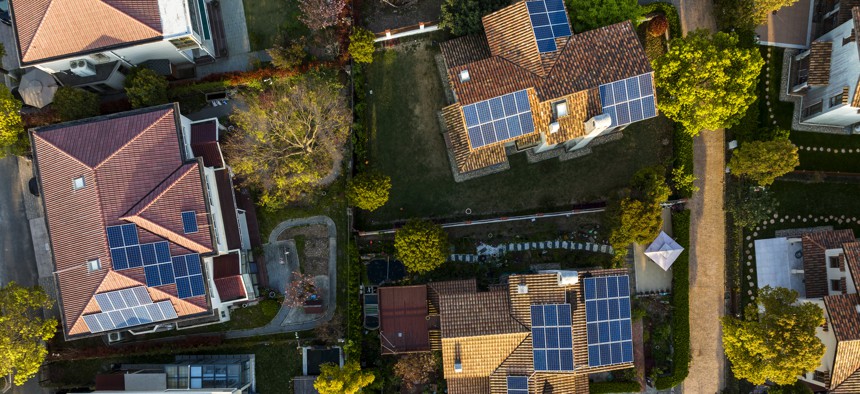
owngarden via Getty Images
In Preview of Debt Limit Fight, House Republicans Target Climate Funds
A House Environment subcommittee voted to claw back $27 billion from President Biden’s climate law, signaling what the GOP may demand in future budget negotiations.
In what may be a preview of Republicans’ demands in the looming debt ceiling showdown, some on a House environmental subcommittee on Tuesday voted to claw back $27 billion from the Biden administration’s massive signature climate law.
The partisan 11-6 vote in a House Energy and Commerce subcommittee would repeal the $27 billion Greenhouse Gas Reduction Fund, which designates $20 billion in funding for so-called green banks and $7 billion to subsidize efforts by state and local governments to reduce greenhouse gas emissions in low-income and disadvantaged communities.
“While our constituents are suffering under the weight of inflation, Congress should not have established this $27 billion slush fund for green advocacy groups,” said Rep. Gary Palmer, an Alabama Republican, the bill’s sponsor.
Rep. Cathy McMorris Rodgers, a Washington Republican who chairs the full committee, called the funding an example of the “reckless spending provisions included in the Democrats’ partisan rush-to-green reconciliation package.”
House Republicans have not yet detailed the spending cuts they are demanding in return for agreeing to raise the nation’s debt ceiling. But the bill’s approval signaled the support it has among Republicans, including Rodgers, the influential chairwoman of the committee dealing with the nation’s energy policies.
Republican lawmakers have previously told Route Fifty that they intend to try to strip away funding from the climate measure, creating a standoff with Senate Democrats and the Biden administration in the upcoming budget negotiations. If an agreement isn’t reached, the nation risks defaulting on its debt and jeopardizing the ability of cities to borrow money.
Associations representing the nation’s cities and counties have blasted the idea of stripping away billions promised to them to combat climate change in statements to Route Fifty.
“State and local governments are fiscally responsible,” said Clarence Anthony, CEO and executive director of The National League of Cities. “As intergovernmental partners, attempting to repeal federally-approved funding for reducing greenhouse gas emissions—or any program—is a disregard for the role of cities in building a strong economy and providing critical services to residents.”
“Any reduction in federal resources could hinder certain counties’ goals and undermine the intergovernmental partnership necessary to strengthen our community resiliency,'' added Mark Ritacco, chief government affairs officer for the National Association of Counties, said in a statement to Route Fifty.
Environmental groups including Earthjustice, Environmental Defense Fund and The League of Conservation Voters released a letter in advance of the vote opposing it. “This program has unprecedented potential to improve lives by investing in high-impact, community-based projects that reduce climate pollution and improve public health,” they wrote.
The vote came as the Environmental Protection Agency said in preliminary guidelines issued last week that it expects to issue notices of funding opportunities for the two pots of money early this summer.
In its guidance on the $7 billion in grants to state and local governments, tribes and nonprofit organizations, the agency said it will prioritize applications for residential and community solar projects, as well as storage technologies and upgrades to the existing solar power. The law requires that the projects benefit low-income and disadvantaged communities.
Rep. Frank Pallone of New Jersey, the full committee’s top Democrat, said the $7 billion for state and local governments emphasized disadvantaged communities because “we know that in many cases, they've felt the brunt of a lot of pollution, industrial pollution, and other types of pollution in the past.”
According to estimates, the $7 billion could benefit up to a million households, said Shannon Baker-Branstetter, senior director of domestic climate and energy policy for the left-leaning Center for American Progress. “Low-income households who will see lower energy bills will get the main benefit from community solar and rooftop solar,” she said. “And then of course, reducing pollution and being able to transition to cleaner power instead of fossil fuel-based power is huge.”
At least $8 billion of the $20 billion for nonprofit green financing organizations must be spent on low-income or disadvantaged communities. So-called green banks use public dollars to leverage private investments.
The Inflation Reduction Act funds are a mammoth boost to green banks at a time when more states are investing money in them. About a dozen states are funding green banks as they grapple with climate change, Baker-Branstetter said. Others like New Mexico and Alaska are considering it.
The Connecticut Green Bank, for instance, has used $322.4 million in public funds to leverage $2.26 billion in private investment, Baker-Branstetter said. The banks then loan money for projects like installing solar at homes or apartment buildings in areas that have historically had trouble getting financing.
Last May, for instance, DC Green Bank and the solar company PosiGen, announced a $7 million deal to install solar power at 320 low- and moderate-income homes in Washington, D.C. The installations are expected to create hundreds of jobs and reduce CO2 emissions by 2,500 tons, a press release said.
Other federal programs use public dollars to leverage private investments, Pallone said, “so why not do the same thing when you're trying to reduce greenhouse gas or reduce the impact of climate change?”
Kery Murakami is a senior reporter for Route Fifty.
NEXT STORY: Lawmakers Want Watchdogs to Look Into Their Agencies’ Ethics Policies on Stock Ownership







